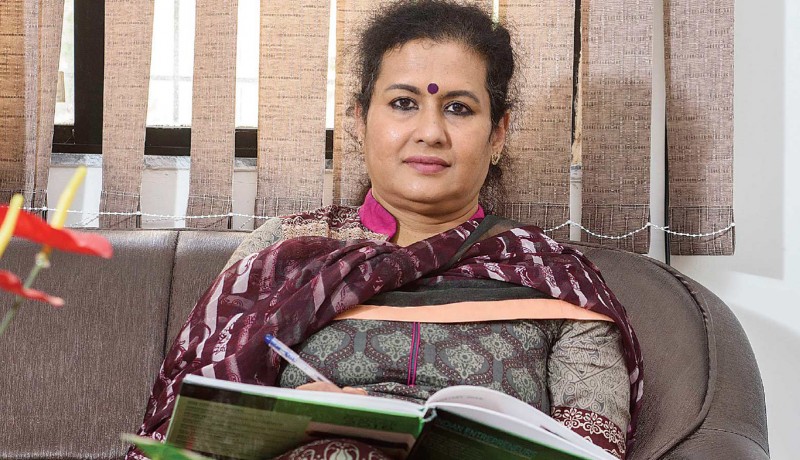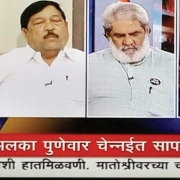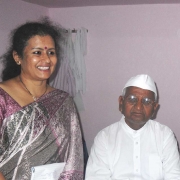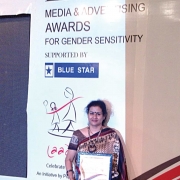
People

Pune-based investigative journalist and RTI crusader Vinita Deshmukh brings the mighty to their knees, reports Suchismita Pai.
Vinita Deshmukh’s third book is due to be published this month. A fictional novel that explores the life of a journalist is a big change for this activist and journalist, who is used to asking tough questions and making bold statements backed by hard facts.
An investigative journalist for over three decades and one who wielded the Right To Information (RTI) Act to devastating effect, Deshmukh has taken on the might of multinational corporations, left a positive impact on the environment and even questioned the loftiest office in the nation, that of the President of India.
“The primary duty of newspapers is to tell the common man about the scandals of the government, the taxpayer whose money is being played around with. The idea is to get citizens angry and act, to provoke them to vote, to invoke RTI and protest against injustice,” says Deshmukh, who is currently consulting editor at Moneylife magazine, where she has a weekly column on RTI-based stories. She is also consulting editor of a business magazine called Corporate Citizen.
Our crusader confesses that she had always aspired to become a journalist. Born in Belgaum, in Karnataka, she soon moved to Odisha as her father worked as a public health engineer with the government there. She seems to have inherited her passion for writing from her father, who wrote for Maharashtra Times while in Odisha. After schooling in Berhampur, Odisha, Vinita moved to Pune, to enrol in journalism school but ended up getting a bachelor’s degree in history from Fergusson College. She married young and with a baby soon after, she was determined not to give up on her dream. So she explored the option of writing from home. “I felt that the power of the pen is most formidable and it was very close to my heart. I always thought ‘if only I can do my bit, if only I can make a change….’ So I always wanted to be a journalist.”
In 1987, Deshmukh started writing a weekly ‘Market Watch’ column for Women’s Herald, a pullout publication of Maharashtra Herald, the English daily of the Sakal group. And when the Express Group launched a newspaper edition in Pune, she began writing a column for them too. Usha Somayaji, former editor of the Herald, recalls her three-decade-long association with Deshmukh with great pride and fondness. “Vinita was extremely eager and worked with immense conviction,” she says. “She was curious, tenacious and hardworking, all of which are essential qualities for any journalist. She has demonstrated the power of information and the RTI in the arsenal of a journalist.”
Deshmukh’s tenacity saw her rise up the ranks quickly, evolving from a fledgling writer to taking charge of Eve’s Express, Midweek and then Citizen, all erstwhile publications of the Express Group. “I think Citizen gave me my identity,” she shares. “From exposing drug orgies in Koregaon Park to the environmental degradation of Mahabaleshwar and building violations there, we did a lot of impactful stories.”
The Mahabaleshwar campaign went on for four years and was instrumental in getting the twin hill stations of Mahabaleshwar and Panchgani declared as eco-sensitive zones, reveals Deshmukh, who has twice won the prestigious Statesman Award for Rural Reporting.
These were pre-RTI days and the social crusader says the going was rough. “The Mahabaleshwar stories in the mid-1990s were much before the RTI Act came into being,” she explains. “It was an arduous task to procure documents directly from government officers. Even as a journalist, you had to build credible contacts and only then would they oblige.”
One of Deshmukh’s early brushes with the power of the RTI Act came through a prisoner in Pune’s Yerawada Jail. Harking back to 2003, in times of the Maharashtra RTI Act, she says the prisoner was serving a life sentence in the open part of the prison owing to good behaviour. When he was abruptly shifted to the closed prison for spearheading an agitation against the substandard quality of food served to inmates, he filed an RTI application with the jail superintendent, seeking a copy of the Indian Prison Manual Act to know the section under which they had shifted him to the closed jail. His application was rejected. He then wrote to the resident editor of the Pune edition of The Indian Express on a plain inland letter, asking about his right as a citizen to get answers, even as a convicted criminal. Entrusted with the story, Deshmukh called up the jail superintendent, which led to a flurry of activity and a fresh RTI application from the prisoner. The inmate was given a copy of the prison manual within 24 hours. “It was an epiphany about the power of the RTI Act and how great a tool it was, especially for a journalist.”
After a long stint of incisive journalism with The Indian Express, Pune, from 1987 to 2006, Deshmukh felt disheartened by the realisation that ‘fashion’ had replaced ‘passion’ in journalism. She wanted more. “I was not interacting with my readers and so I was not enjoying my work,” she confesses. “I was depressed and wanted to quit.” Thus, she brainstormed with her seniors at the Express and soon found herself at the helm of a weekly tabloid that aimed to take up issues directly affecting the citizens of that city. That’s how, in January 2007, Intelligent Pune hit the stands.
With the newspaper as the platform and the RTI Act as her ally, Deshmukh took on Dow Chemicals, one of the largest manufacturers of chemicals in the US. She took up cudgels in March 2008 and with the help of the RTI, contested Dow Chemicals’ claim that its ₹ 400-crore unit in Chakan, Pune, was not only an ‘R&D facility’ as the company had claimed but a full-fledged manufacturing unit using 20 hazardous chemicals that were polluting nearby rivers. Eventually, Dow Chemicals had to move out of Chakan. The sustained campaign, which ran for 10 months, earned Deshmukh the Chameli Devi Jain award for ‘Outstanding Woman Media Person’.
Deshmukh was in the national news again in December 2009 for her book To The Last Bullet, which also made international headlines for telling Vinita Kamte’s courageous story of taking on the establishment after her police officer husband, Additional Commissioner Ashok Kamte, was killed in action in the 26/11 Mumbai terror attack. The book, which she co-authored with Vinita Kamte, was based on disclosures under Section 6 and Section 4 of the RTI Act, and called up log records between the Mumbai Police Control Room and the officers on Ground Zero. It revealed that Kamte and two other police officers had lost their lives to alleged police negligence. It was Deshmukh’s maiden book but it was appreciated for her skilful language and sensitive approach to the subject. Kamte says that, out of the blue, she had received a phone call from Deshmukh, who had asked to see the RTI work done on her late husband’s death. “There is so much youthful passion in her voice when she speaks about the RTI and its power,” says Kamte. “Unlike others, I did not have to explain anything to her. It was as if she read my mind about the next steps and came up with a book along the same lines as how I wanted to tell Ashok’s story.”
All this while, Deshmukh was still editor of Intelligent Pune, which eventually folded up in 2011. In its four illustrious years, the newspaper had exposed many issues pertaining to the city, for which her team of journalists consistently conducted inspection of files in government offices under Section 4 of the RTI Act. Apart from the ouster of Dow Chemicals, a 60-ft-wide road being carved out of the Aundh Botanical Garden was brought to an abrupt halt. Besides, spaces reserved as green zones in Balewadi, which were being illegally used for construction, also opened up.
In 2012, Deshmukh grabbed national headlines again. This time, she used the RTI Act to expose how the then President of India, Pratibha Patil, had grabbed a huge piece of Army land to build her post-retirement mansion. She wrote a series of 13 hard-hitting articles across several weeks, after which Patil returned the 260,000 sq ft of prime defence land on which she was building her home (as a former President, she was eligible only for 2,500 sq ft). This development led to Deshmukh’s second RTI case study book, The Mighty Fall (2012).
Injustice comes in many shapes and sizes and, despite her high-profile victories, Deshmukh never turns her back on a battle begging to be fought. Through a column she writes in Moneylife magazine, she succeeded in getting the Pune Passport Office to streamline its functioning and has also taken on the might of the National Highways Authority of India through the power of the RTI.
“I believe RTI is the best weapon for journalists as it ensures you have enough evidence to level charges. Citizens must stand up for their rights. Most people come to me seeking help. Though honest and equipped with lots of helpful information, they seek anonymity. I tell them that they must rise above their fear, which is only a state of mind. If they want a better country for future generations, they need to be environmentally, civically and socially conscientious,” says Deshmukh, who has won the 2014 Laadli Media Award for investigative journalism as well as the Acharya Atre Award for her book, The Mighty Fall.
Prabhakar Karandikar, who retired as divisional commissioner of Pune, recalls his over decade-long professional association with Deshmukh when he was in government service and she was with The Indian Express. “She is a person of strong convictions with a never-say-die spirit,” he affirms. “She would bring every issue she was following up to its logical end.” When Karandikar was with the Industries Department of the Maharashtra government, Deshmukh sought clarifications from him on procedural aspects with regard to the Dow Chemicals row as well as other issues, with information she had secured through RTI and other sources. “I have high regard for her intellectual integrity and fighting spirit, even though we did not always agree on everything,” he adds. “She is a thorough professional and respects boundaries. She would not misquote or embarrass a source and built confidence in that aspect.”
At the age of 57, Deshmukh is now a grandmother but the fire in her belly has not dimmed. She has formed an organisation called ‘RTI Forum for Instant Information’ (RFFII) and, along with other prominent RTI activists in Pune, conducts free workshops for citizens interested in learning about the use of Section 4 of the Act, which allows citizens to inspect files in government offices. Apart from this, she travels the world when invited to speak at conferences and summits, and is also guest faculty at various media institutes, where she lectures on the RTI Act.
Further, Deshmukh is part of the Pune Metro Jagruti Abhiyaan and the Green Pune Movement campaign, which is fighting to save the hills of Pune as the powers that be want to open these up for residential construction. “I have tried to follow my passion and urge everyone else to do the same,” she emphasises. “It is our right as well as our duty to use all available resources for a better life for all. Just like a body part stays fit with exercise, good governance comes about through exercising our rights, and information is primary to exercising all other rights.”
Photo: Hemant Patil Archival pics courtesy: Vinita Deshmukh Featured in Harmony — Celebrate Age Magazine March 2016
you may also like to read
-
For the love of Sanskrit
During her 60s, if you had told Sushila A that she would be securing a doctorate in Sanskrit in the….
-
Style sensation
Meet Instagram star Moon Lin Cocking a snook at ageism, this nonagenarian Taiwanese woman is slaying street fashion like….
-
Beauty and her beast
Meet Instagram star Linda Rodin Most beauty and style influencers on Instagram hope to launch their beauty line someday…..
-
Cooking up a storm!
Meet Instagram star Shanthi Ramachandran In today’s web-fuelled world, you can now get recipes for your favourite dishes at….










